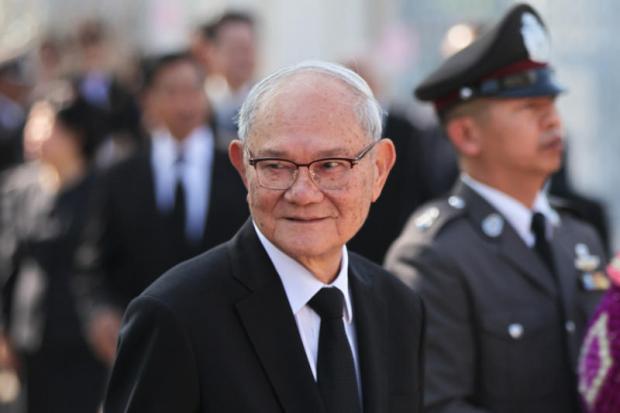
Chief charter writer Meechai Ruchupan said he cannot confirm that a general election will take place next year following the regime roadmap, saying both the election commission and political parties must be ready before fresh polls can proceed.
Addressing the Constitution Drafting Committee (CDC), Mr Meechai said it was difficult to assess when the transition from military rule to an elected government would take place.
With new organic laws to be introduced, the Election Commission's (EC) and parties' readiness would likely determine when a general election would be held, he said.
Both entities would be required to make changes to meet new election rules, which is why the two bills involving the EC and political parties were drafted first, said the CDC chairman.
He said parties would be given 180 days to make preparations, after which elections would follow.
The CDC chairman insisted the charter panel would strictly observe the time frame for drafting up all ten organic laws.
"The CDC is proceeding with the government's roadmap -- that is to draw up all the 10 organic laws within 240 days after the enforcement of the charter," he said.
Mr Meechai also defended the charter's provision allowing the junta chief to retain his sweeping powers under Section 44 of the interim charter until a new government is formed.
Concerns were raised the section could hinder the return to democratic rule.
He said the section needs to be retained to ensure law and order, not to block parties from contesting in polls.
Mr Meechai expressed confidence the political ban that has been in place since the 2014 coup would be relaxed when the bills governing the EC and political parties take effect.
The CDC chairman also went on to explain that stricter rules and harsher punishments featured in the organic laws have not been devised out of spite or bad feeling towards politicians or their parties.
He said the charter and its mechanisms were drawn up to address political instability and discrepancies, and they aim to create a political system that will answer the public's needs and resolve conflicts that cause social and political divisiveness.
He called on parties to undertake reforms and engage the public in their activities as much as possible. However, he said, he did not expect overnight changes.
According to Mr Meechai, parties and their candidates face tough challenges under the new rules because the candidates who lose to a protest vote will be disqualified.
Mr Meechai brushed off observation that two major political parties appeared to have steered clear from the drafting of the organic bills, saying it would not pose any problem.
He said the CDC was paying attention to suggestions and criticisms from all stakeholders.
Earlier this month, charter drafters insisted the draft organic law on the Election Commission (EC) will strengthen the poll regulator's power to clamp down on electoral fraud.
Speaking at a forum on the draft law, Mr Ruchupan said the elements in the law were drawn from the referendum-approved charter as well as the draft proposed by the EC.
The CDC kept some elements from the EC's draft and abandoned others which did not fit the CDC's ideas, Mr Meechai said.
Meanwhile, Surachai Liangboonlertchai, vice-president of the NLA, said yesterday a general election was unlikely to take place next year as expected.
He said he believed the polls could be held in the middle of 2018, all things going well.
According to Mr Surachai, the NLA has its hands full next year, gearing up for 10 organic bills and 50 other related legislation drafts.
The assembly is also expected to scrutinise some 40 bills which are marked as urgent by the cabinet.
"This is the NLA's work for next year, the final year of the roadmap before elections in the middle of 2018. These draft laws are necessary tools for national administration," he said.
He also urged every sector to join hands in resolving political conflicts and divisiveness to ensure the country would not slip into another political crisis.
Democrat Party deputy leader Nipit Intarasombat yesterday called for clarification on why the government's roadmap is being postponed, saying he could not see reasons for the roadmap's delay.
Mr Nipit said the details of the roadmap leading to fresh elections were specified in the new charter and that if the roadmap was to be postponed, it meant the new charter would not be enforced as planned.
He said he could not see why enforcement of the charter would be postponed and demanded to know the basis for such speculation.